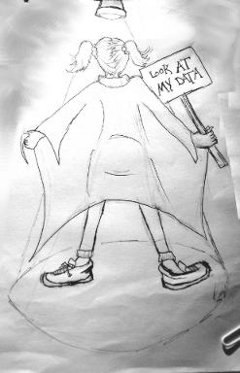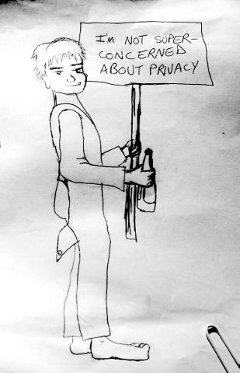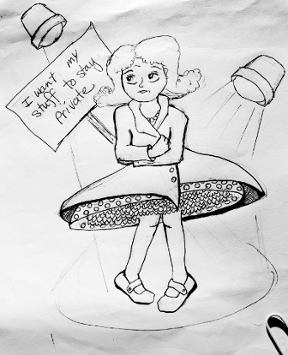Facebook has given privacy a kick in the groin. If this is news to you, you should probably check out:
Facebook’s Gone Rogue; It’s Time for an Open Alternative [Wired]
or
Top Ten Reasons You Should Quit Facebook [Gizmodo]
or
Facebook Further Reduces Your Control Over Personal Information [EFF].

-
FB Privacy Policy: Longer Than the Constitution
Those who’ve been watching the plucky start-up were already aware that Facebook is mired in accusations that it was founded by a crook and funded by a nut and some gooks. Into this fray comes Facebook’s controversy over their privacy settings. It used to be that Facebook provided a space that was just for friends and family. “Just” as in “only.” As in, not public.
The new privacy settings even led to a movement last month to have a “Quit Facebook Day.” Even if you manage to tackle FB’s labyrinth of privacy settings, don’t use any apps, or never use FacebookConnect you still can’t control what happens when your friends fail to make their stuff private. You can’t stop Facebook from censoring your messages. Even if we all flock back to Myspace or Friendster or Tribe [or Whatever] we have no guarantee that that data won’t be given away. It would probably be wise to consider anything hosted on a faraway computer you can’t control as potentially public, even email. At the very least we should commit to using sites that have consistent and reasonable privacy policies (thus the total opposite of Facebook [1][2]).
But entrusting Facebook is clearly no longer the way to go. Here’s why. In my myriad conversations about this issue, I get one of three responses:
 “I don’t care about who sees my data or my friends’ data. I posted it so anyone could see it.”
“I don’t care about who sees my data or my friends’ data. I posted it so anyone could see it.”
This person shouldn’t be on Facebook. There are much better public sites that do everything Facebook does but better and more beautifully (more on that later).
“Privacy isn’t a big deal to me but there are some things I’d like to put online that I don’t want the whole world to see.” 
This person shouldn’t be on Facebook. These are the people Facebook seeks to confound with their myriad privacy on-off switches, e.g. most of us. Because these folks aren’t too concerned about most of what we put out there, we won’t be meticulous about making sure everything is set to private. We won’t think of our Facebook stream as a blog for all the world to see and eventually we will accidentally post something that will get us embarrassed, fired, divorced or deported.
“privacy is very important to me. I only want to share stuff with my friends.”
This person shouldn’t be on Facebook. Because this person cares about privacy. If anything, they should be boycotting Facebook. Wake up: Facebook wants our info to be public so they can make more money on their ads. Facebook CEO Mark Zuckerberg has admitted he’s ok with the whole thing being confusing because he doesn’t believe in privacy.

Oh the outrage!
But alas, Quit Facebook Day has come and gone and your account still remains. Don’t feel too bad…so does mine.
Now that Facebook has decided to make it standard to share people’s stuff, why are we still using Facebook? Simple: because no matter how much better the other sites are, Facebook is where the people are. But having all the people didn’t stop Myspace fom sinking or Friendster before it. We just need a critical mass of people to join these other sites and Facebook will be history.
The thing is: we don’t need Facebook! Even if Facebook were offering a reasonable privacy policy there are much better sites. And here’s the good news! They all allow automatic posting to Facebook. For those of us not boldly motivated enough to quit Facebook, we can follow our friends on these sites while automatically sending updates to those still lost in the land of blue and white status updates. Eventually these sites (which are all still relatively new) will grow full of enough users that we can all jump ship.
“But,” I hear you asking, “what are these wondrous websites?” Patience, dear reader, for you have discovered the subject of page two…
Continue reading We Don’t Need Facebook →



